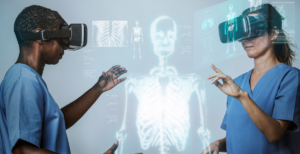Exploring the interaction between humans and robots in supporting inclusion and autonomy.
Social robotics has emerged as an exciting field aimed at improving the quality of life for people with disabilities by providing technological companions that promote inclusion and autonomy. In this article, we will explore how social robots are transforming the lives of people with disabilities by offering emotional support, physical assistance, and companionship in various situations.
Social robots are designed to interact and communicate with humans in a natural and understanding way. They can be programmed to perform various tasks, from reminding people to take medication to providing emotional support during difficult times. For people with disabilities, social robots can play a crucial role in promoting social inclusion and autonomy.
A prominent example is the use of assistive robots in caring for people with physical or cognitive disabilities. These robots can assist with everyday tasks such as lifting objects, preparing food, or aiding mobility. By providing physical and emotional assistance, these robots can improve the quality of life and independence of people with disabilities, allowing them to live more independently.
Additionally, companion robots are being tested in domestic and community settings as companions for people living alone or who may benefit from additional social interaction. These robots can perform various functions, such as reminding to take medication, helping with simple household tasks, providing entertainment, or offering companionship and conversation.
Another example is the use of companion robots in therapeutic or educational settings. These robots are designed to interact with users in a friendly and compassionate manner, providing emotional and social support. For people with disabilities, these robots can be playmates, learning tools, or conversation partners, helping reduce isolation and encourage community engagement.
Social robotics is transforming the lives of people with disabilities by offering technological companions that promote inclusion and autonomy. From assistive robots that provide physical assistance to companion robots that offer emotional support, social robotics is expanding possibilities for people with disabilities and improving their quality of life. As this technology continues to advance and be tested in various settings, we will likely see even more life-changing innovations promoting inclusion in society. These advances can lead to significant changes in the daily lives of people with disabilities, providing them with greater independence, emotional security, and community participation.





